IN-DEPTH |
In 26 years representing Missouri in the U.S. Capitol, and in nearly 50 years of public service, Roy Blunt has seen many changes — and has contributed more than his share to the public good, say those who have worked closely with him.
At 11 a.m. today (noon eastern time), Blunt leaves elected office after serving seven terms in the U.S. House and two six-year terms in the U.S. Senate, and he will be on hand for the swearing-in of his replacement, Republican U.S. Sen. Eric Schmitt.
In public comments during recent months, and in a wide-ranging interview with the Hauxeda, Blunt touched on highlights of his career, as well as his concerns and hopes for the future.
- He’s proud of his accomplishments, reflected recently in several buildings and programs being renamed in his honor. “My guess is I’ve been in every Missouri county more times than maybe any other politician in the history of the state. And I like it and I learn from it. And, you know, I think the effort is well worth it.”
- He’s optimistic: “America is a work in progress. We are better than we have been. We are not all we would like to be.”
- But he’s concerned about the direction of political discourse, and the feeling that it matters less these days whether a politician actually makes a difference by working with others to get things done.
In comments at a late October luncheon hosted by the Springfield Area Chamber of Commerce, Blunt said: “The performance standard has been replaced now by the anger standard.” News coverage now focuses mostly on “how angry you are,” rather than on whether you are getting things done, he said.
He amplified those comments in a Daily Citizen interview at his Springfield home on Dec. 28.
Dressed casually, wearing blue jeans, cowboy boots and a Patagonia vest, Blunt explained: “If you want to get covered on MSNBC or a lot of the evening Fox News programs, outrage appears to be the best ticket to coverage. At the same time, there’s very little coverage of the daily business of government.”
He lamented the decline in news coverage from traditional media sources, particularly newspapers. Blunt said when he arrived in Washington, D.C., in 1997, Missouri newspapers had nearly 20 reporters combined covering the nation's capital, leading to substantial coverage of the actions of Congress and individuals like himself. “I was able to continue to have the same kind of relationship with voters that I had always had, which was: ‘You gave me the job, here’s how I’m doing it.'”
Now, Blunt said, he rarely sees a reporter from Missouri.
Technology, including the growth of social media, as well as the dramatic decline in for-profit media means “the way people get their information changes,” Blunt said, also suggesting that “long-form journalism doesn’t have nearly the audience that it used to have.”
Increased anger and outrage among politicians is due in part to changing attitudes of voters. “There’s a lot of genuine outrage with government,” Blunt acknowledged. “What you saw happen around the Tea Party movement in 2009 and '10, was there was clear evidence that lots of people had lost their faith in government and were tired of hearing how everything government did was going to be good for them, where it turned out to be not so good for them at all.
“So it’s not just the way people get their news, there is an obvious sense of people’s frustration with government that may not have been there (before).”
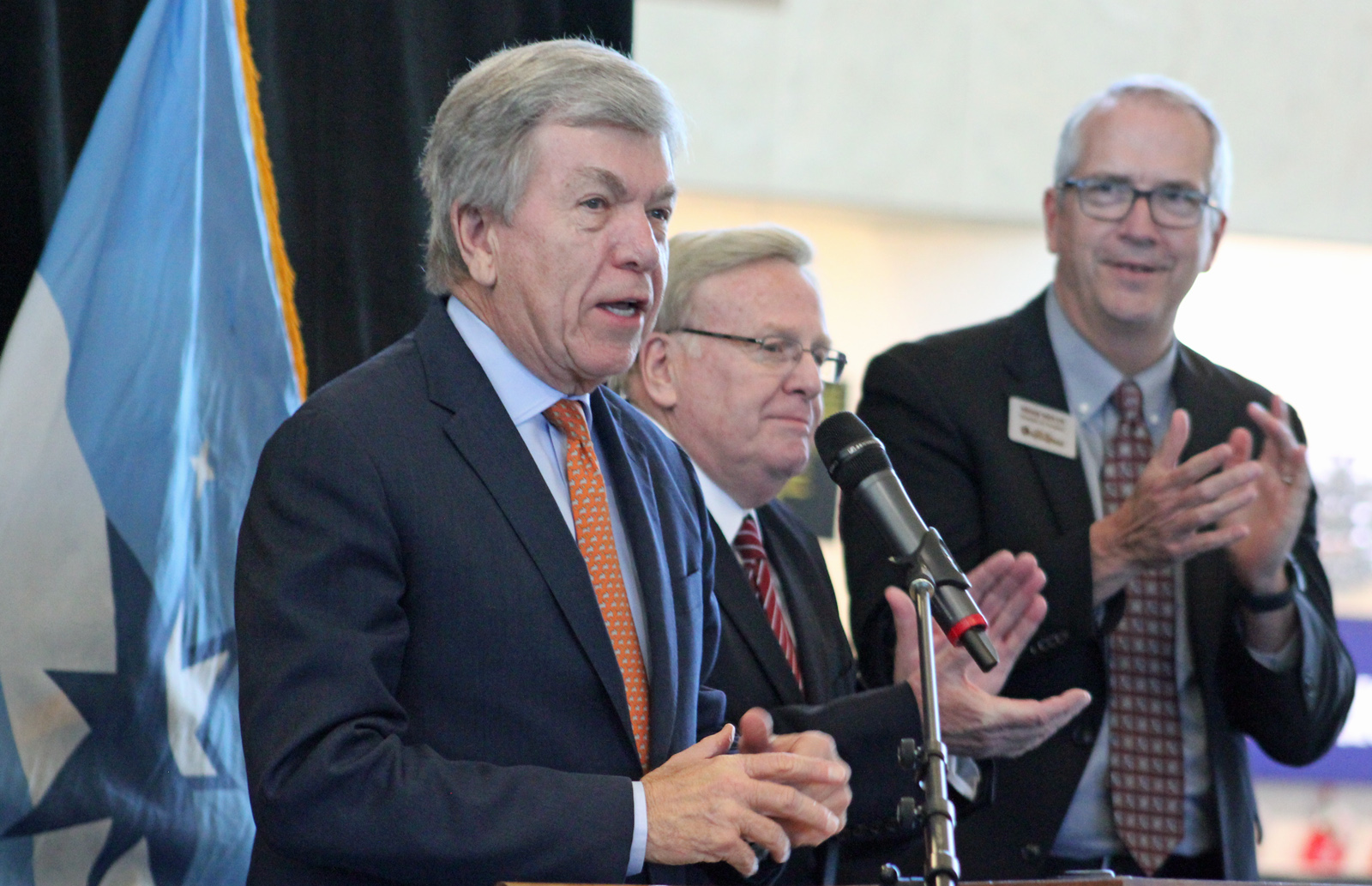
Consistent conservative with bipartisan reputation
A conservative, Blunt has taken mainstream Republican positions on issues such as abortion, gun rights, taxes and economics during his tenure in Washington, D.C., and he was a consistent supporter of the policies of the Trump Administration, including voting twice against impeaching President Donald J. Trump.
And while he made frequent appearances on national TV talk shows, Blunt was not a firebrand, preferring instead to work behind the scenes — and, in particular, across the aisle on issues of most importance to him, such as promoting the hiring of veterans, expanding access to mental health treatment and community health centers, and funding increases for the National Institutes of Health (NIH).
He is most proud of his work as ranking member of the Senate Appropriations Committee Subcommittee on Labor, Health and Human Services, and Education. During his time, funding for NIH has grown 57 percent — an average of nearly $2.3 billion per year, bringing the total to roughly $47.5 billion in 2023. He’s proud that this funding has helped complete the mapping of the human genome, potentially unlocking the key to many diseases and cures.
He’s also widely credited for his role in leading to a five-fold increase in funding for research into Alzheimer’s disease. In September 2022, NIH dedicated the Roy Blunt Center for Alzheimer’s and Related Dementias on its main campus in Bethesda, Maryland. At the dinner, Republican and Democrat leaders in the House and Senate joined together to praise Blunt.
‘He’s been uniquely effective,’ McConnell says
“Senators come and senators go, but to actually make a difference is really important,” Senate Minority Leader Mitch McConnell, R-Ky, said at the dinner.
“And in this particular era, I think we typically run into two types of people in politics: those who want to make a point, and that’s pretty easy to do; and those that want to make a difference, which is much more difficult in a team sport, which is the sport that we play if we want to make a difference. And nobody, nobody that I’ve served with, and I’ve been around a long time, has been more effective than Roy Blunt,” McConnell said, concluding: “He’s been uniquely effective.”
Blunt said his biggest legacy is in working with U.S. Sen. Debbie Stabenow, a Michigan Democrat, to expand high-quality mental health and addiction services nationwide through Community Behavioral Health Clinics. Blunt and Stabenow created these community clinics through the Excellence in Mental Health Act, which became law in 2014.
Missouri was among the first eight states in the program, and the pilot was later expanded to two more. After five years, Blunt said the data showed emergency room use for mental health issues had declined, law enforcement agencies say the amount of time people spend in detention for mental health concerns is down, and even hospitalizations for other health issues is down for people with mental health concerns.
As a result, the program is now going to be opened up to all 50 states over the next 10 years.
As an example of his approach, Blunt reflected on his time as the whip in the House, which he said was the most fun job he had. “We never lost a vote,” he said — and each vote was bipartisan with the exception of two bills (the George W. Bush tax cut and a Labor appropriation bill).
Bipartisanship requires a certain mindset, he said. “We don’t have to agree on everything, we just have to agree upon one thing.” At one point when Republicans were in control of the Senate, his staff looked at how many Democrats he had worked with on at least one piece of legislation: he had co-sponsored bills with 44 of the 48 Democrats that session.
But things have changed. These days, Blunt said, “more and more candidates are willing to say what they would never do.”
“Never say what you will never do. ... That’s just not the way it works and it’s certainly not the way democracy works.”
roy blunt
His advice: “Never say what you will never do.”
“That’s just not the way it works and it’s certainly not the way democracy works.”
“If you get 80 percent of what you want, that’s a victory.”
Blunt said voters expect politicians to keep an open mind and learn as they go. “It’s usually not very hard to figure out what’s the right thing to do. It’s also, by the way, usually not very hard to figure out whether it’s popular or not.”
He said he always figured his job was to find out all of the information that voters themselves don’t have time to figure out.
‘People have their own facts’
The changing role of media — the polarization of national media (think MSNBC vs. Fox News) and the diminishment of local journalism — is a contributing factor and makes it harder to find consensus, Blunt said.
“People not only have their own opinions, but they have their own facts.”
Blunt said it’s not that he pays no attention to calls to the office or polling, he just says those things should have little impact on how he does his job — which is to use his best judgment “to do what you would do if you had time to do everything you’d hired me to do, as opposed to what you would do if somebody calls on the phone and says ‘how do you feel about X.’”
One of his most recent major votes will go down as representative of his efforts at bipartisanship. Despite criticism from many fellow conservatives, Blunt was among 12 Republicans to join Democrats in passing the Respect for Marriage Act, which provides federal protections for same-sex and interracial marriages. The bill does not require all states to legalize same-sex marriage, but it requires all to recognize another state’s legal marriage.
Blunt backed the bill after adoption of a bipartisan religious liberty amendment. “People who are legally married in one state have the same protections and responsibilities in any other state that are offered to and required of marriages,” Blunt said in a statement. “And, this legislation enhances the religious freedom for all Americans by protecting religious organizations from retaliation by federal agencies due to their views on marriage.”
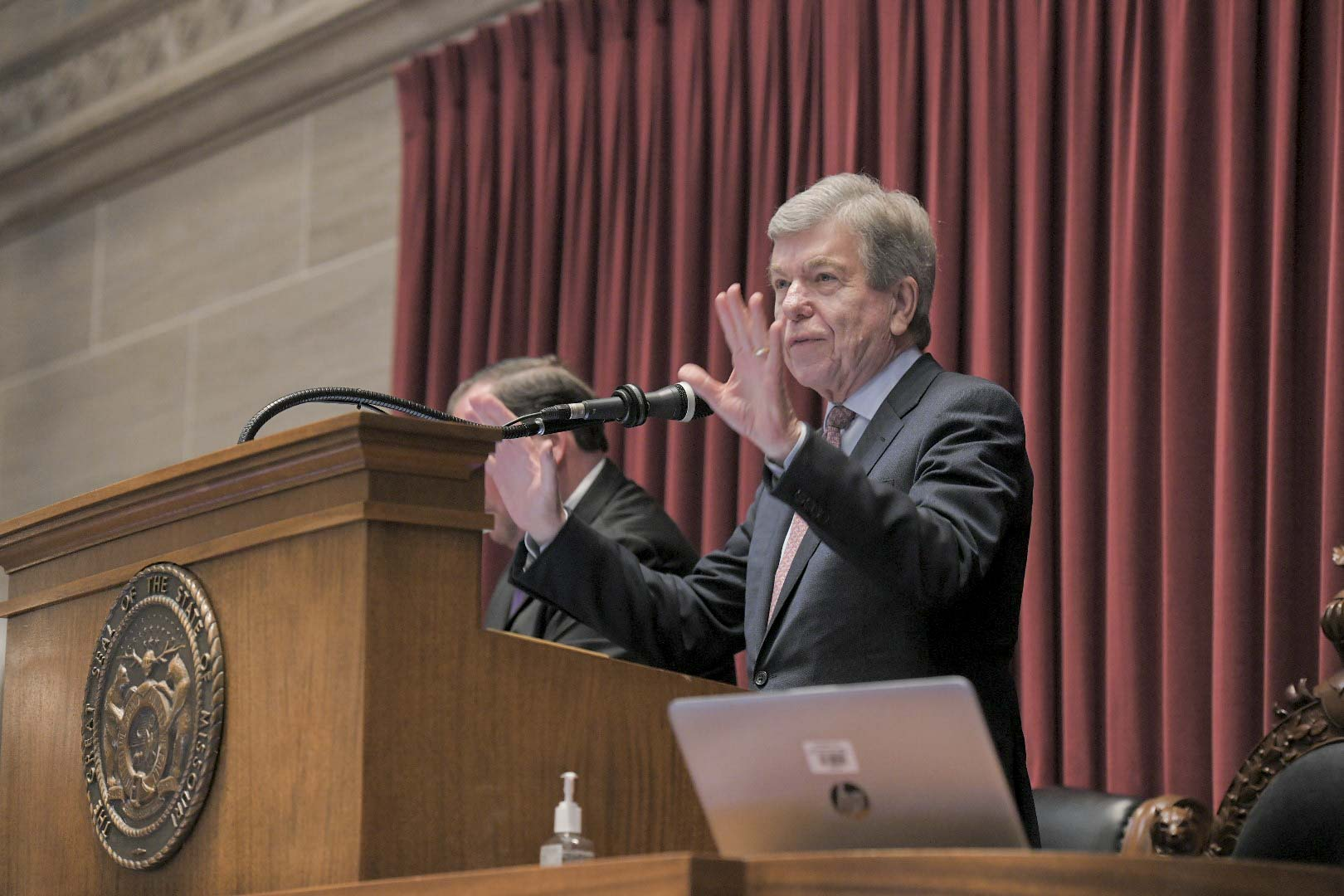
Political style rooted in courthouse days
Blunt, who turns 73 on Jan. 10, was 23 and a high school history teacher in Marshfield when the opportunity came to be appointed in 1973 as Greene County clerk and chief election official for the growing county. State politics were dominated by Democrats at the time.
“My sense of these jobs largely comes out of the county courthouse and being an elected Republican in a very Democratic state. … If there’s anywhere in America you’re likely to get a problem that’s solvable solved, it’s in a county courthouse. You go in that building, whether it’s in Gainesville, Missouri, or Springfield, Missouri, a building full of elected officials, if you’ve got a problem, they want to do their very best to solve it if they can, and do everything they can to let you know they did everything they could to try to solve your problem.
“And I think, you know I’m very practical and solution-oriented, and every solution doesn’t have to be perfect,” he said.
Since he got his start at the state level when Democrats outnumbered Republicans nearly 2-to-1 in the General Assembly, Blunt said, “You learn to reach out and find out what’s doable with the other people that voters sent to do the work that needs to be done.”
His ability to work with others helped him in Congress, where he earned a reputation for bringing home the bacon.
While member-directed spending, or earmarks as they have come to be known, went out of style 10 years ago, they made a resurgence in this past session of Congress.
“I think it may be coming back into style as people realize that somebody is going to decide how to spend all this money,” Blunt said, referring to the control unelected bureaucrats have in federal spending decisions. He noted members of Congress direct slightly less than 1 percent of the discretionary budget, which itself is less than 30 percent of all federal spending.
“It’s an important part of the process. It’s not coincidental that when the member-directed projects went away, the budget process collapsed,” Blunt said, noting that it led more often to every appropriation bill being rolled into one big bill that had to pass at the end of the year. “When you took the members out of the process … they didn’t have anything to go home and explain why they voted for the big highway bill.”
Even when earmarks were considered passé, Blunt found a way to get money for local projects. “For 10 of the 12 years I was in the Senate, you couldn’t (earmark) … and there is a huge list of things that got done.” He explained that often meant “advocating within the bureaucracy, not only just writing a support letter, but making a support phone call or two, and there are a lot of ways to get this done and earmarks are not the only way.”
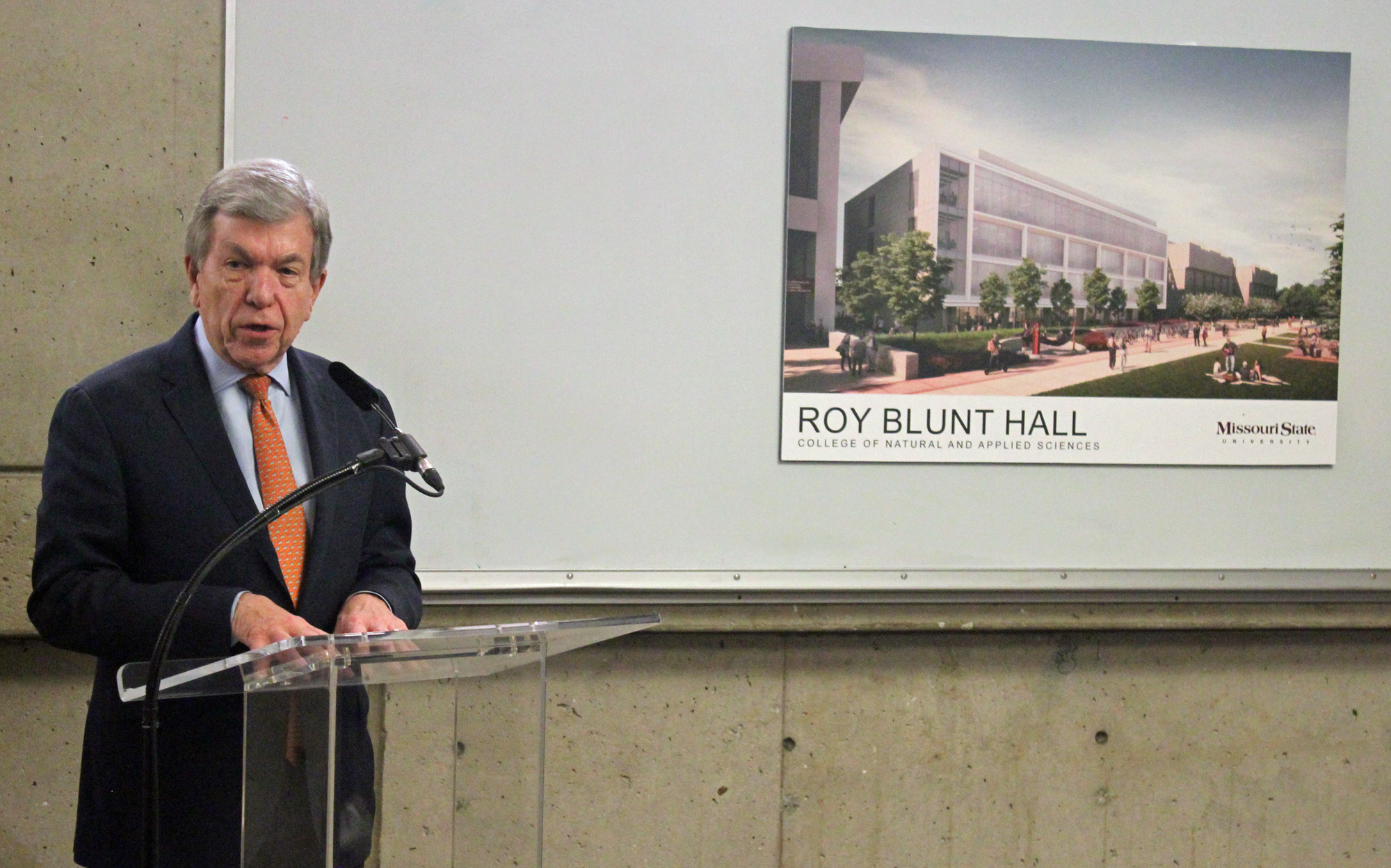
Farewell praise and honors (click to read tributes from state and local officials)
In his final weeks in office, Blunt has been subject to many testimonials and honors.
- Jordan Valley Community Health Center dedicated a new center at Grand Street and Kansas Expressway as the Roy Blunt Center for Family Health and Wellness.
- The city of Springfield honored Blunt by naming the main Midfield Terminal at the Springfield-Branson National Airport as the Roy Blunt Terminal.
- Missouri State University held a groundbreaking ceremony for the $80 million renovation and expansion of its science and research center, formerly called Temple Hall and now to be called Roy Blunt Hall. Blunt secured $50 million for the project last summer, and in one of his final acts in late December, secured another $30 million to be used for classrooms, labs and office equipment for health and life sciences programs.
“He’s had an immense impact,” said Matt Morrow, president of the Springfield Area Chamber of Commerce, in introducing Blunt at an Oct. 26 event. Morrow rattled off a list of projects, including: funding for the Jordan Valley Innovation Center on Boonville Avenue, which helped spur reinvestment in that area north of the square downtown; a $21 million grant for the Grant Avenue Parkway project; multiple area transportation projects, including significant funding for the airport; expansion of broadband internet access; funding for higher education; and his advocacy and funding for mental health treatment.
“Roy to me is the epitome of a public servant,” said Springfield Mayor Ken McClure. “He truly has made this his life’s calling and we have seen the benefits and reaped what he has done for over 50 years — and that’s rare.”
In remarks at the Roy Blunt Hall groundbreaking, Missouri State University President Clif Smart said: “In every generation in America, there are special people who make a real difference in their communities, in their state and, sometimes, in the world. Sen. Roy Blunt is one of those special, once-in-a-generation people.
“He has created a legacy in public service” through his extraordinary support for science and health research, for higher education generally and for his “unprecedented support for Missouri State University, from which he graduated.”
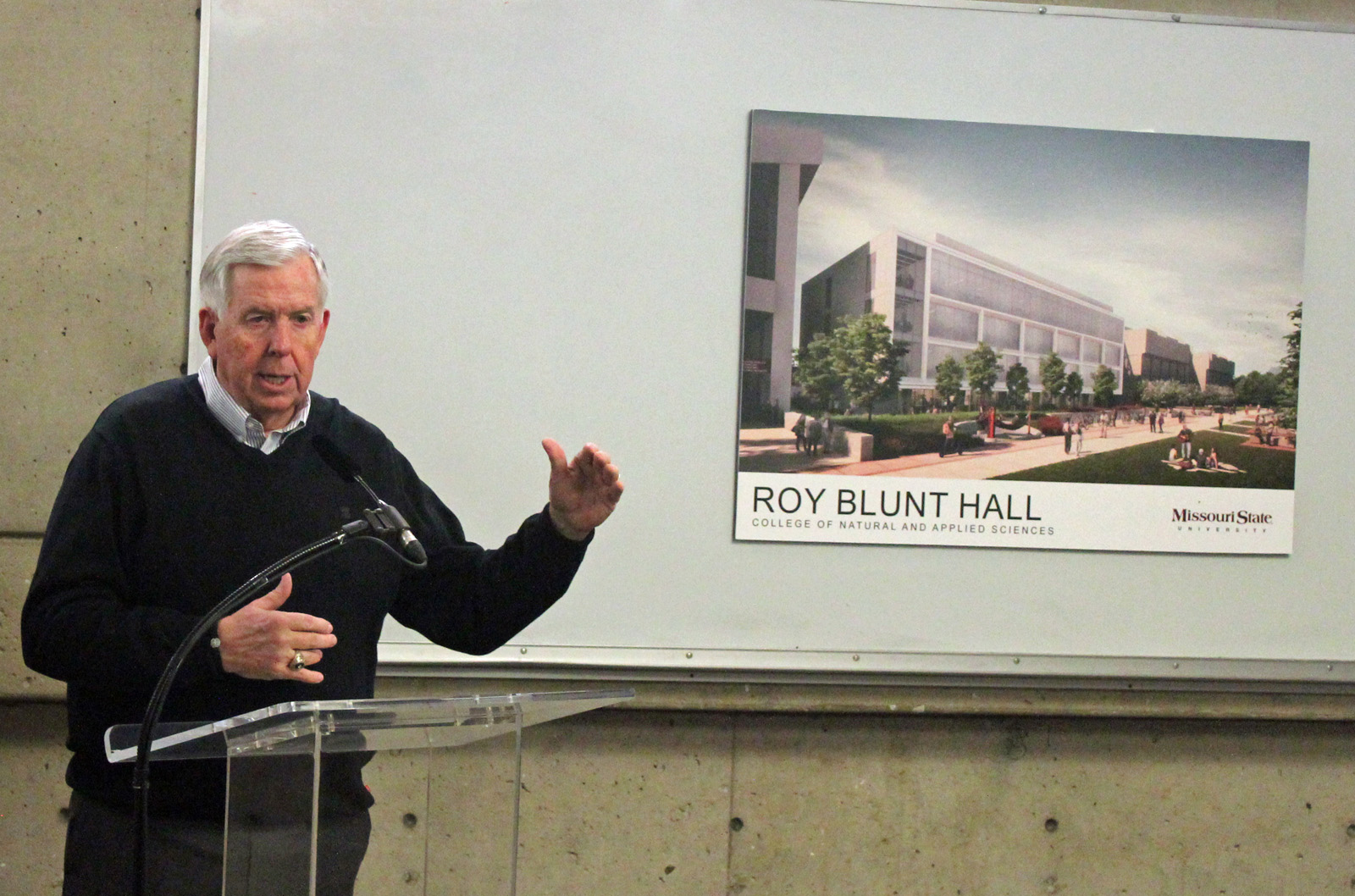
Gov. Mike Parson, in remarks at the MSU groundbreaking, said he will miss Blunt. “The things he’s done in his career for this state, for this university, absolutely is second to none.”
Parson continued: “To believe what he believes about the future of Missouri, and why these investments are so important for our universities, and the same basic fundamental is, we are developing the future of Missouri. We’re developing the next generations.”
Lt. Gov. Mike Kehoe, in remarks at the airport terminal dedication, said it was difficult to explain “what he (Blunt) has meant to us personally as a leader, as a person of faith, as a person who understands what a statesman should be like, how to carry himself, how to conduct himself, the respect we saw that he not only earned in Washington, D.C., but in every corner of the state.”
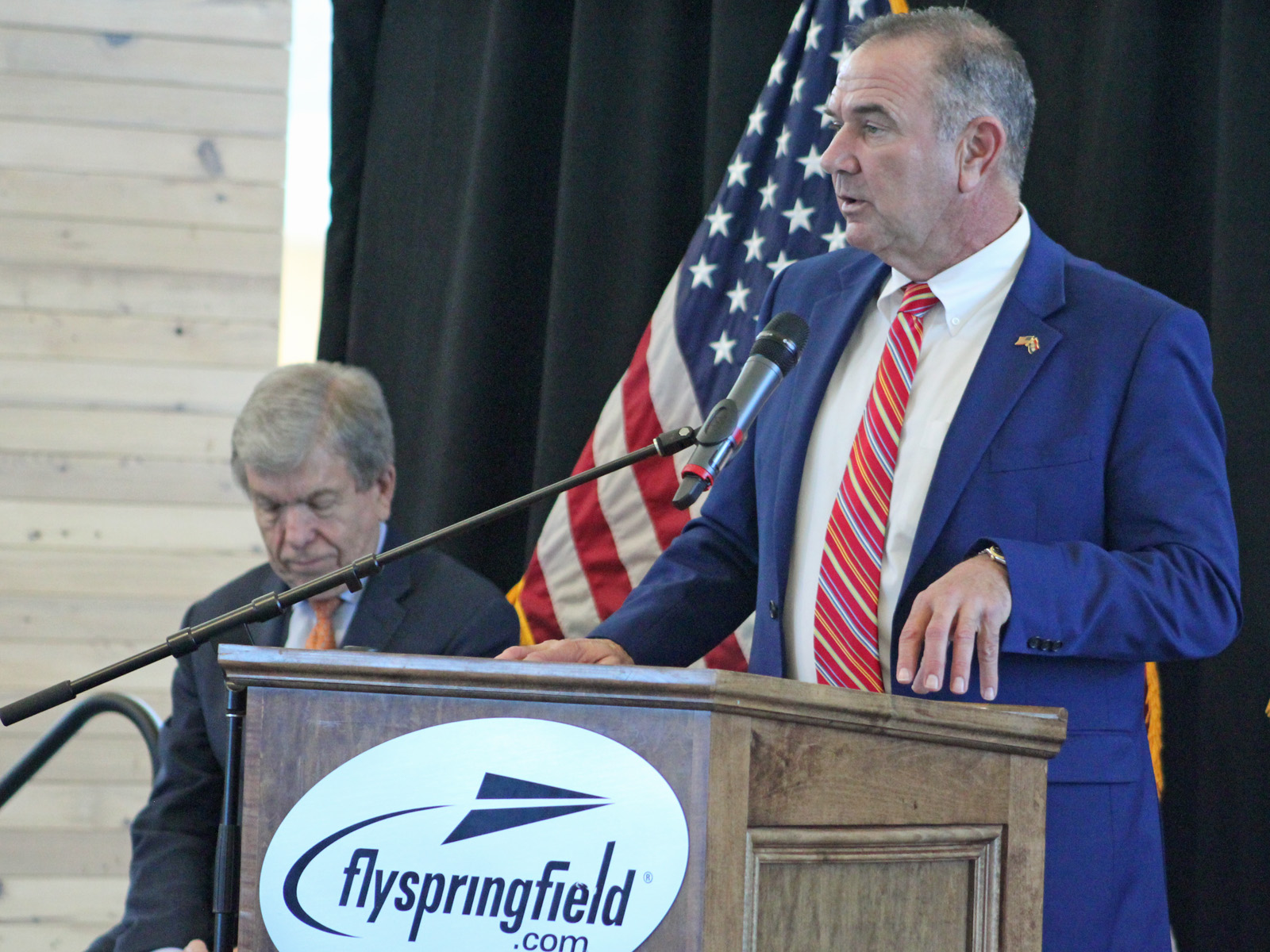
“Roy Blunt has left the place better than when he found it,” Kehoe said.
50 years of public service
If you are younger than age 50, Roy Blunt has essentially worked for you his entire life.
“I’ve loved doing it,” he said.
Following his appointment in 1973 as Greene County clerk, Blunt survived his first election despite headwinds caused by the Watergate scandal that took down Republican President Richard Nixon. He served 12 years as county clerk, eventually winning two other elections.
Blunt made his first run for statewide office in 1980, winning the Republican nomination for lieutenant governor, but losing in the general election. Four years later, he handily won his bid to become secretary of state, becoming the first Republican to hold the job in 50 years.
After two terms, he ran for governor in 1992, losing in the Republican primary to then-Attorney General William Webster, who went on to lose to Democrat Mel Carnahan in the general election.
Following defeat, Blunt stepped away from politics, but not entirely from public service. From 1993 to 1996, he served as president of Southwest Baptist University in Bolivar, where he had received his bachelor’s degree in 1970. (In 1972, Blunt received his master’s degree in history from then-Southwest Missouri State, now Missouri State University.)
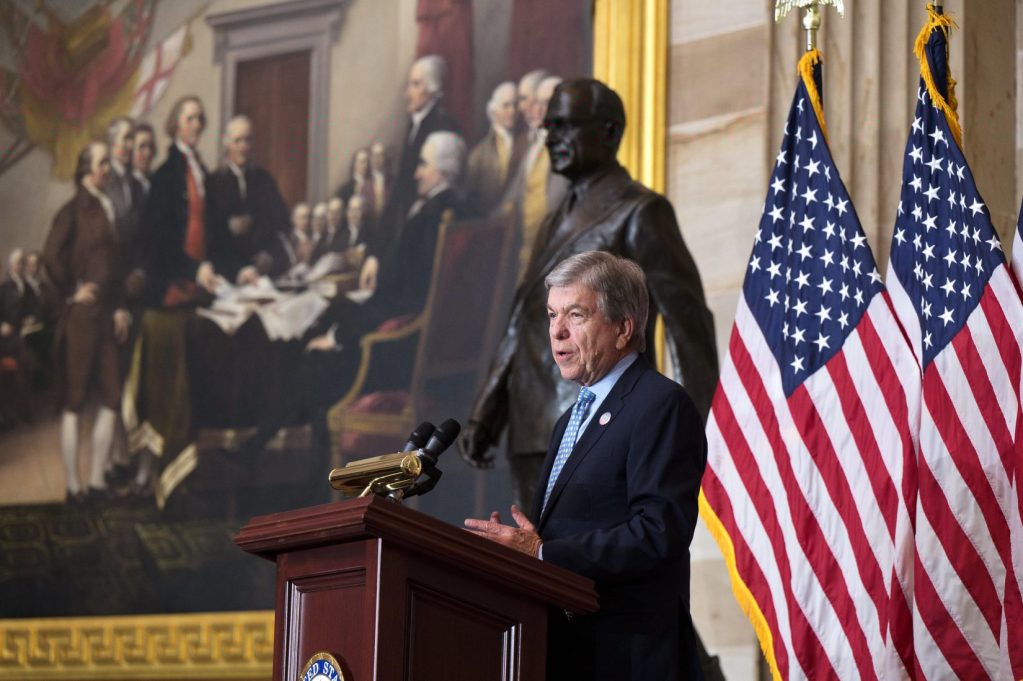
Congress and leadership role beckoned
In 1996, when famed U.S. Rep. Mel Hancock honored his pledge to serve just four terms in Congress as 7th District representative, the door was opened for Blunt to return to elective politics. He defeated Gary Nodler in the Republican primary and then Democrat Ruth Bamberger in the general election, taking 65 percent of the vote.
He never looked back.
After just one term, Blunt ascended to a leadership role as Chief Deputy Whip, making him the top vote-counter in the Republican caucus. Four years later, in 2003, he became Majority Whip as Republicans were in the midst of eight years in control of the House. In September 2005, when Texas Rep. Tom DeLay was indicted on felony charges related to campaign finance law violations, Blunt became acting majority leader.
His reputation as a consummate vote-counter was about to be tested.
As Republicans began the 2006 election year, Blunt announced he had the votes to become majority leader — and put himself in position to become Speaker at some point. But in a secret ballot, he lost the job to U.S. Rep. John Boehner of Ohio. Democrats took control of the House following the 2006 election, and Blunt moved into a role as Minority Whip, but he stepped down in late 2008, after Republicans again found themselves in the minority.
Early in 2009, Blunt announced plans to seek a U.S. Senate seat after incumbent Republican Senator Kit Bond decided to retire instead of seeking a fifth term. Blunt took 71 percent of the vote in a nine-person Republican primary in August 2010, then handily defeated Democrat Robin Carnahan, who was Secretary of State, and daughter of former U.S. Senator Jean Carnahan and former governor Mel Carnahan.
Within his first year in the Senate, Blunt moved into a leadership role as vice chairman of the Senate Republican Conference as the GOP was in the minority. He continued in that role when Republicans took the majority following the 2014 elections.
Blunt was re-elected in 2016, taking a narrow victory over Democrat Jason Kander. He moved up to being Chair of what is now called the Senate Republican Policy Committee in 2019, the No. 4 ranking role for Republicans. He was chair of the Senate Rules Committee (which sets the agenda for the flow of legislation) and became ranking member when Democrats took control of the Senate in 2021. He also served on the Select Committee on Intelligence.
In March 2021, he announced he would not seek a third term. “It’s better to leave too early than to leave too late,” he told a crowd in Springfield recently.
His Senate colleagues — Republicans and Democrats alike — offered their sincere farewells in remarks on the floor Dec. 6. (See video here.)
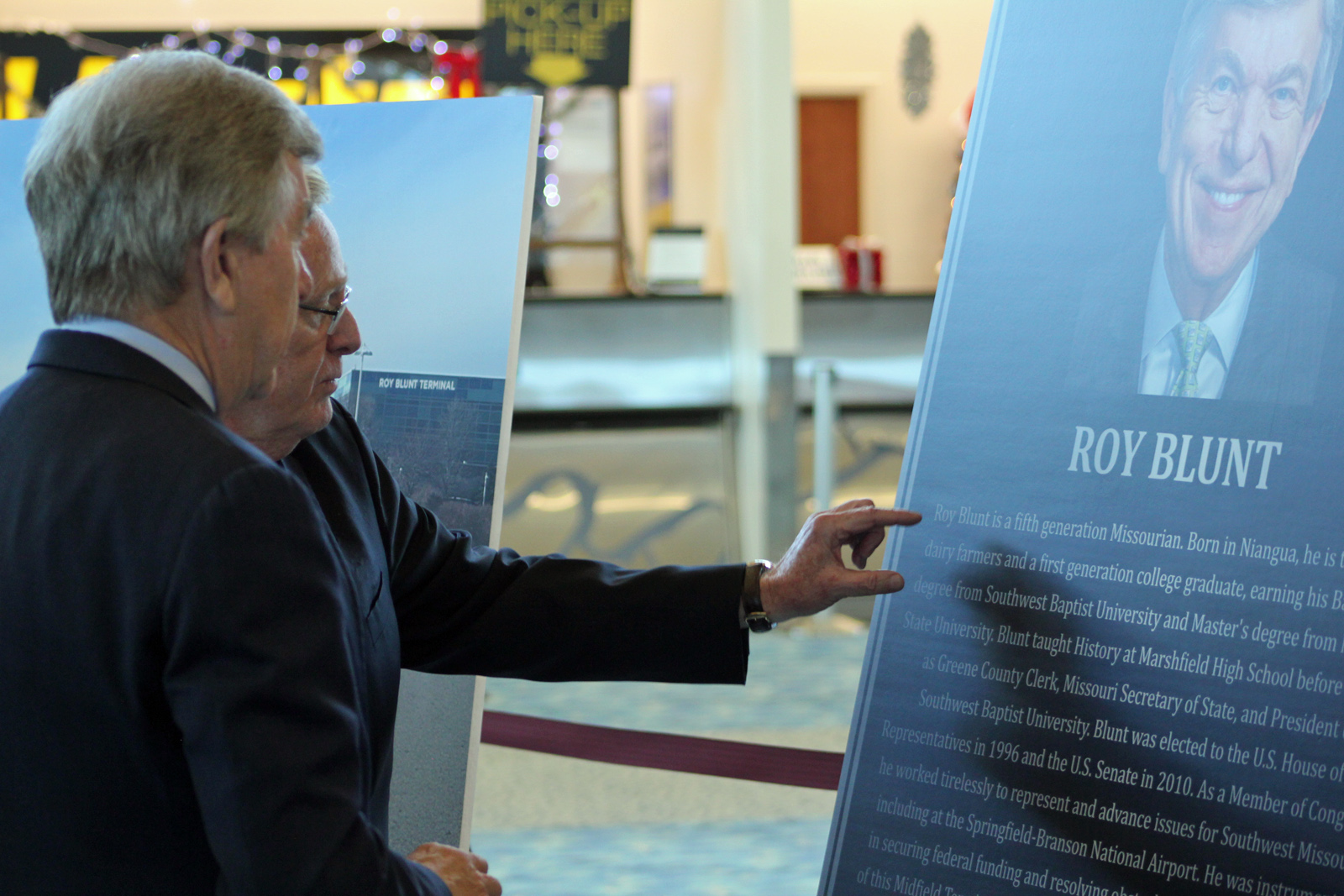
‘Time to do one more thing’
Blunt has been vague about his future. “I don’t plan to retire. I love to work,” he said, believing he “has enough time to do one more big thing.”
He said it’s likely to be “a combination of things,” rather than just a single job. He suggests he has a couple of ideas in mind, including work that may involve some travel, and notes he especially likes “the management part of work.”
He gets excited talking about the future of health care, of geospatial science (including a new St. Louis headquarters for the National Geospatial-Intelligence Agency) and how Missouri could play a key role in meeting the needs of the world.
For example, he said estimates show that between 2010 and 2060, world food demand will double.
“It took like 10,000 years to figure out how to grow all the food we grow today. We have about 40 years to figure out how to double all the food we grow today. Nobody’s in a better place to be part of that than we are. The Mississippi River Valley is the biggest piece of contiguous agricultural land in the world. It’s the only piece of agricultural land in the world that has its own built-in navigation system. There are more miles of navigable waters in the Mississippi River Valley than in the rest of the world put together. ... So we have this huge opportunity here.”
Among things to worry about, he cited cybersecurity. “We put lots of information out there without thinking, in a serious way, about how to protect it. And we’ve created lots of dependency on the cyber network without a lot of thought about how to protect it.”
In his commencement speech Dec. 16 at Missouri State University, Blunt talked about the emerging economy and opportunities arising from things like autonomous vehicles, synthetic biology and 3D printing.
“The world is changing in incredible ways. I’m excited about it. I’m optimistic about it. It’s the greatest country in the world. The greatest system for how to compete in the world. What a great time to commence,” he told graduates.
“Everything in life has its challenges. It’s my last year in the Congress. I’ve cast 13,000 votes in the Congress. About 12,970 of them, absolutely good. The other 30 of them I might have done differently if I’d known then what I know now.”
He continued: “It is a great country. America is a work in progress. We are better than we have been. We are not all we would like to be. You know the people who wrote the Constitution, promised not a perfect union, but a more perfect union. We are working toward that as a nation today.”
In his days following retirement from Congress, Blunt said he figures to spend more time in Missouri.
“Our state is so reflective of the rest of the country. You know, Missouri is really where the country comes together.”

